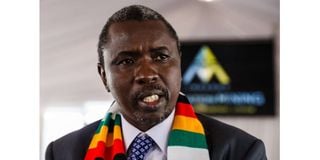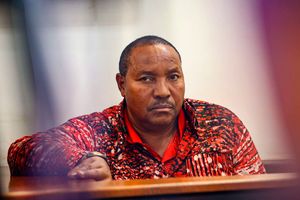Premium
US slaps sanctions on Zimbabwean tycoon

Kudakwashe Tagwirei in a past event.
What you need to know:
- Kudakwashe Tagwirei becomes the third ally of President Mnangagwa to be added to the US sanctions list this year.
- His company Sakunda Holdings was also added to the list.
Mugabe's ouster in a military coup in 2017 saw his successor President Mnangagwa push for re-engagement with the US.
Relations between the two countries, however, remain frosty.
The US on Wednesday imposed sanctions against a business tycoon with close links to Zimbabwean President Emmerson Mnangagwa and former leader Robert Mugabe for allegedly abetting corruption.
Kudakwashe Tagwirei, whose business interests range from gold mining, financial services to fuel, becomes the third ally of President Mnangagwa to be added to the US sanctions list this year.
His company Sakunda Holdings was also added to the list.
Derailed Development
The US Treasury's Office of Foreign Assets Control (OFAC) said the wealthy businessman was being punished for providing support to the leadership of the government of Zimbabwe.
"Mr Tagwirei and other Zimbabeean elites have derailed economic development and harmed the Zimbabwean people through corruption...The United States supports the economic well-being of Zimbabwean people and will target repressive and corrupt acts by Zimbabwean politicians and their financiers," deputy secretary Justin Mazunich said.
OFAC said the measures coincide with the second anniversary of the killing of six people by the military during protests against delays in the release of Zimbabwe's presidential election results.
The US agency says Mr Tagwirei utilised his relationship with high level Zimbabwean officials to clinch State contracts "and receive favoured access to hard currency, including US dollars."
"In turn, (Mr) Tagwirei has provided high priced items such as expensive cars to senior level Zimbabwean government officials," OFAC added.
"Since former president Robert Mugabe’s 2017 departure, Tagwirei used a combination of opaque business dealings and his ongoing relationship with President Mnangagwa to grow his business empire dramatically and rake in millions of dollars."
Killed protestors
In March, the US added Zimbabwe’s State Security Minister Owen Ncube and the country’s ambassador to Tanzania Anselem Sanyatwe to the sanctions list.
The envoy to Tanzania was punished for commanding the troops that killed protestors on August 1, 2018 while Mr Ncube was accused of being behind a wave of abductions of civil society and opposition activists in the last two years.
Besides restrictions imposed on Zimbabwe's ruling elite, the US also mantains an economic embargo against the southern African country.
The US first imposed sanctions on Zimbabwe in 2001 when it enacted the Zimbabwe Democracy and Economic Recovery Act (Zidera).
Zidera bars Americans sitting on boards of international financial institutions such as the IMF and World Bank from supporting financing arrangements for the southern African country.
A year after the law was passed, the US introduced an executive order of measures that imposed a travel ban and an assets freeze against the late Robert Mugabe and his close associates.
Zimbabwe has always argued that the sanctions were punishment for its land reform programme that began in 2000, and saw the seizure of nearly 5,000 commercial farms owned by white Zimbabweans that were re-distributed to blacks.
Frosty relations
Mr Mugabe's ouster in a military coup in 2017 saw his successor President Mnangagwa push for re-engagement with the US.
Relations between the two countries, however, remain frosty with the US insisting that Zimbabwe has not yet implemented economic reforms necessary for the sanctions to be reviewed.
Australia, Canada, New Zealand and the European Union have also maintained embargoes on Zimbabwe since 2002.





